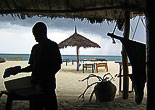Burning of shops in Zanzibar

While the burning of shops in Zanzibar is being interpreted as a criminal and political act, ‘nobody has asked where the root of the problem may lie in the economic and social sphere,’ says Abdul Sheriff.
The burning of the mabanda belonging to ‘Wabara’ at Pwani Mchangani in Zanzibar has become a big story, treated as a criminal or a political act by Zanzibaris against mainlanders. It may be both, but nobody has asked where the root of the problem may lie in the economic and social sphere.
The first question that may be asked is whether all these 80 or so shops indeed belonged only to mainlanders, and there were not any belonging to local people. From the picture that I have seen, the whole area was swept clean. If this was the case, then the second question is how such an odd situation could have arisen in a fishing village in Zanzibar, that suddenly there should be such a flood of the ‘wabara’, without providing any opportunity to the local people to benefit from any development there.
The answer may lie in the way tourism has invaded Zanzibari villages, and how it has undermined local economy and society. I remember going to nearby Nungwi village in 1979 before the tourism invasion. It was not a rich village, but it was to a considerable extent a neat village and a comfortable self-reliant community subsisting on local agriculture and fishing, selling the surplus to the town. When I visited the same village last year, it had been turned upside down, and I could not recognise it at all. It has been flooded with shops blaring loud music, with bars and mabanda selling all sorts of things to tourists and others. It resembles Kariakoo.
A couple of years ago there was a conflict there where women of the village came out demonstrating against the huge inflow of prostitutes who they said were breaking up their families there. Some years previously, a politician extended his bar into one of the streets of Zanzibar Stone Town against the existing law, with drunkards and prostitutes blocking the street such that even a self-respecting man would not dare to pass, let alone women. He was approached by one of the European neighbours, but he was rudely told to shove off. Other neighbours approached the police, but they did nothing to enforce the law. Where everything failed, some disgruntled person resorted to the bomb. Overnight, the bar went indoors where it was supposed to be according to the law in Zanzibar.
More recently several bars that had sprung up in the middle of peaceful residential communities in Zanzibar were burnt. In the recent case also there have been complaints that the mabanda were haunts of bars and prostitutes.
Did the government or the police take any action to deal with the grievances of the local villagers to prevent the destruction of these communities for the sake of the tourist dollars and those pursuing them? Therefore, should we be surprised that some local villagers would resort to be taking law into their own hands when those responsible fail to fulfil their duties?
We should not be surprised, without necessarily condoning such acts. This has been taken by the authorities as a criminal act, and they have promised the ‘full force of the law’ to suppress it. It has been interpreted by those affected as hatred by Zanzibaris against wabara. If there is such ‘hatred’, there must be a reason.
In the persisting widespread discontent in Zanzibar against the union, which many see as not having benefited the smaller partner, but on the contrary, to be destroying local communities, why should we be surprised that it may become a demonstration of the underlying political problem?
Some people on the mainland have raised the spectre of a similar treatment against Zanzibaris on the mainland. If Zanzibaris become responsible for a similar disruption of the local economy and society in their new homes on the mainland, they may suffer a similar backlash.
However, this should not stop us from asking some fundamental questions about our economic policies, especially about tourism, to the neglect of everything else, without considering the social, cultural and even political consequences to our country and its people.
BROUGHT TO YOU BY PAMBAZUKA NEWS
* Professor Abdul Sheriff is executive director of the Zanzibar Indian Ocean Research Institute (ZIORI).
* Please send comments to [email protected] or comment online at Pambazuka News.

